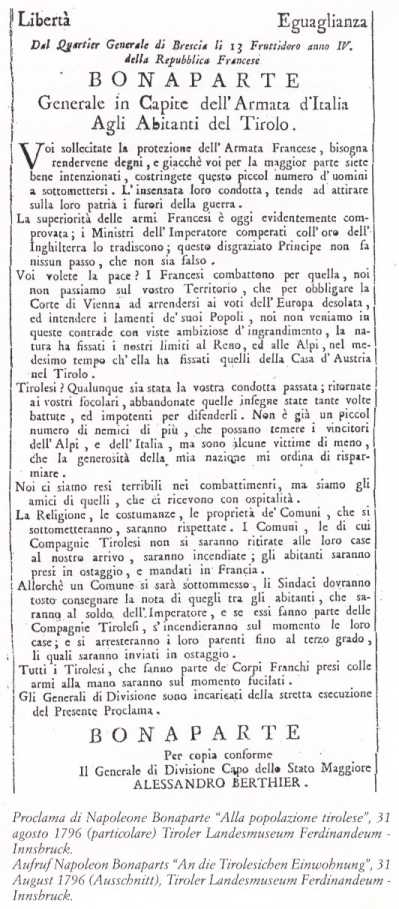
1
|
|
|
|
Liberty
|
Equality
|
From the Headquarters in Brescia on 13 Fructidor year IV .
of the French Republic
B O N A P A R T E
Lieutenant-General of the Army in Italy
To the Inhabitants of the Tyrol .
|
|
You press for the protection of the French Army , you must deserve it , and since the majority of you is favourably disposed , force this small number of men to submit . Their senseless behaviour , is prone to attract on their nation the fury of the war .
| |
The superiority of the French weapons is today clearly proved ; the Ministers of the Emperor bought with the gold of England betray him ; this wretched Prince
doesn't make any move , unless it's false .
| |
Do you want peace ? The French fight for it , we pass through your Territory , only to oblige the Court of Vienna to submit to the votes of the sorrowful Europe , and listen to the moans of its People , we don't come in these countries with ambitious aims of enlargement , nature has established our borders to the Rhine , and to the Alps , and in the same time she fixed the ones of the the House of Austria to the Tyrol .
| |
Tyrolese ? Whatever was your past conduct ; come back to your home lives , leave those banners which were many times defeated , and powerless to defend them . The winners of the Alps , and of Italy , cannot be afraid of a little number of enemies more , but the generosity of my nation orders me to save a few victims .
| |
We were terrible in the fighting , but we're the friends of the ones , who will receive us with hospitality .
| |
The Religion , the customs , the estates of the Communes , that will submit , will be respected . The Communes , whose Tyrolese Companies will not be retired in their houses when we arrive , will be set on fire; the dwellers will be taken hostages , and sent to France .
| |
Whenever a Commune will submit , the Mayors will have to promptly give the list of the ones among the inhabitants , who will be in the Emperor's pay , and if they are part of the Tyroleſe Companies , their houses will be immediately set on fire ; and their relatives until the third degree will be arrested , who will be send as hostages .
| |
All the Tyrolese , who are part of the Frank Corps caught having weapons in their hand will be shot at once .
| |
The Major Generals are in charge of the strict execution of This Proclamation .
| |
B O N A P A R T E
As a true copy
The Major General Chief of Staff
ALESSANDRO BERTHIER .
|
|
Proclamation by Napoleon Bonaparte “To the Tyrolese people”, August 31th, 1796 (detail), Tiroler Landesmuseum Ferdinandeum - Innsbruck (Austria), translated by me.
|

